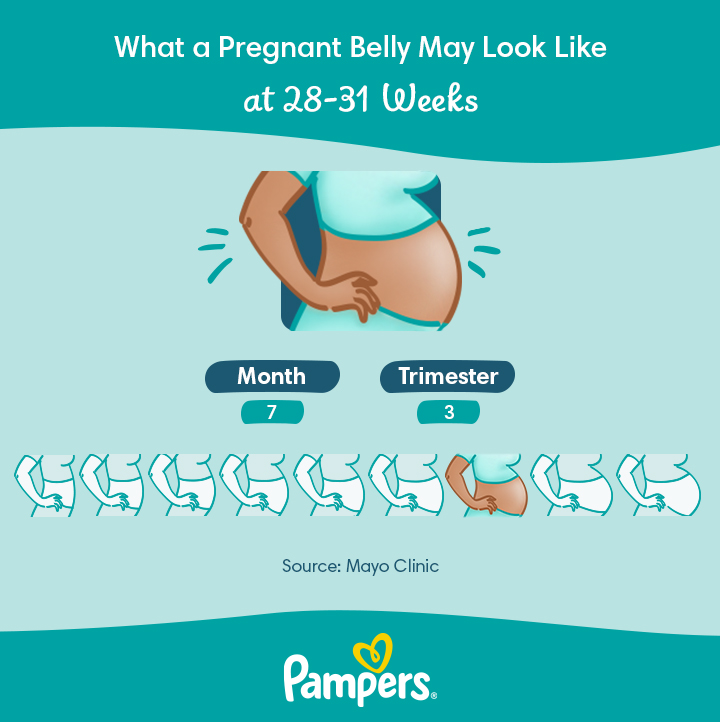
28 Weeks Pregnant: A Comprehensive Guide
Congratulations on reaching 28 weeks of pregnancy! You’re now in the third trimester, and your baby is growing and developing rapidly. Here’s a comprehensive guide to what to expect during this exciting time.
Fetal Development
- Size and Weight: Your baby is about the size of a large eggplant, measuring approximately 14.5 inches (37 centimeters) long and weighing around 2.2 pounds (1 kilogram).
- Physical Features: Your baby’s facial features are becoming more defined, with eyebrows, eyelashes, and fingernails now visible. The skin is still thin and translucent, allowing you to see the underlying blood vessels.
- Movement: Your baby is very active at this stage, kicking, punching, and rolling around in the womb. You may feel these movements as gentle flutters or strong kicks.
- Sensory Development: Your baby’s senses are continuing to develop. They can now hear sounds from outside the womb, including your voice and music. They can also taste and smell amniotic fluid.
- Brain Development: Your baby’s brain is growing rapidly, with new neural connections forming every day. They are also developing memory and learning abilities.
Maternal Changes
- Belly Growth: Your belly will continue to grow significantly during this trimester. You may notice stretch marks appearing on your abdomen, breasts, and thighs.
- Weight Gain: You should expect to gain about 1-2 pounds (0.5-1 kilogram) per week during the third trimester.
- Breast Changes: Your breasts will continue to enlarge and produce colostrum, a yellowish fluid that is the precursor to breast milk.
- Uterine Changes: Your uterus is expanding rapidly to accommodate the growing baby. You may experience Braxton Hicks contractions, which are practice contractions that prepare your body for labor.
- Hormonal Changes: Your hormone levels are still fluctuating, which can lead to a variety of symptoms, including mood swings, fatigue, and increased urination.
Common Symptoms
- Back Pain: As your belly grows, it can put strain on your back, leading to pain and discomfort.
- Leg Cramps: Leg cramps are common during pregnancy, especially at night.
- Constipation: Hormonal changes and pressure from the growing uterus can slow down digestion, leading to constipation.
- Hemorrhoids: Increased pressure on the veins in the rectum can cause hemorrhoids, which are swollen and painful veins.
- Varicose Veins: Varicose veins are enlarged, twisted veins that can appear on the legs and feet.
- Swelling: Fluid retention can cause swelling in the hands, feet, and ankles.
Prenatal Care
- Regular Checkups: You will continue to have regular prenatal checkups with your healthcare provider. These checkups will include monitoring your weight, blood pressure, and fetal growth.
- Ultrasound: Your healthcare provider may recommend an ultrasound at 28 weeks to check on your baby’s growth and development.
- Glucose Tolerance Test: This test checks for gestational diabetes, a condition that can develop during pregnancy.
- Blood Tests: You may have blood tests to check for anemia, infections, and other health conditions.
Lifestyle Tips
- Exercise: Regular exercise is safe and beneficial during pregnancy. Choose low-impact activities such as walking, swimming, or yoga.
- Diet: Eat a healthy diet that includes plenty of fruits, vegetables, and whole grains. Avoid processed foods, sugary drinks, and excessive caffeine.
- Sleep: Get plenty of rest and sleep. Use pillows to support your belly and back.
- Hydration: Stay hydrated by drinking plenty of fluids, especially water.
- Stress Management: Find healthy ways to manage stress, such as meditation, yoga, or spending time in nature.
Preparing for Labor and Delivery
- Birthing Classes: Consider taking birthing classes to learn about labor, delivery, and postpartum care.
- Hospital Bag: Start packing a hospital bag with essential items for you and your baby.
- Birth Plan: Create a birth plan that outlines your preferences for labor and delivery.
- Support System: Identify a support system of family and friends who can help you during labor and after delivery.
Conclusion
Week 28 of pregnancy is an exciting time of growth and development for both you and your baby. By understanding the changes that are happening and following the recommended prenatal care guidelines, you can ensure a healthy and comfortable pregnancy. Remember to listen to your body and don’t hesitate to contact your healthcare provider if you have any concerns.